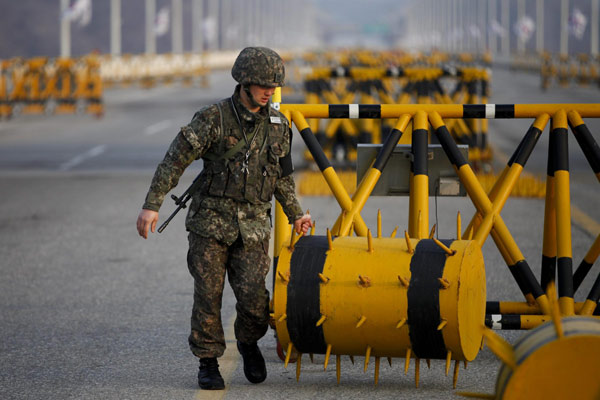N. Korea withdraws all employees from Kaesong
 0 Comment(s)
0 Comment(s) Print
Print E-mail Xinhua, April 9, 2013
E-mail Xinhua, April 9, 2013
The Democratic People's Republic of Korea (DPRK) said on Monday that it will withdraw all its employees from the Kaesong industrial zone.
"The DPRK will withdraw all its employees from the zone," the official KCNA news agency reported, citing a statement issued by Kim Yang Gon, Secretary of the Central Committee of the Workers' Party of Korea.
 |
|
A Republic of Korea soldier sets up a barricade at a checkpoint on the Grand Unification Bridge, which leads to the Republic of Korea, April 8, 2013. [Photo: China Daily via Agencies] |
The statement came shortly after Kim visited the inter-Korean industrial complex earlier in the morning and warned that the DPRK is getting "fully ready" to cope with any new development in the Kaesong industrial zone.
The industrial zone, located in the DPRK city of Kaesong bordering South Korea. was established under an agreement reached at the unprecedented inter-Korean summit in 2000 between late South Korean President Kim Dae-jung and DPRK leader Kim Jong Il.
Kim said the zone had been built as a symbol of reconciliation, cooperation and reunification, but it is now in the grip of a serious crisis.
"It is a tragedy that the industrial zone which should serve purposes of national reconciliation, unity, peace and reunification has been reduced to a theatre of confrontation between compatriots and war against the north," he said. "The existence of such zone is no better than nothing."
Kim said the DPRK will examine the issue of whether to allow the existence of the zone or to close it "as the South Korean authorities and military warmongers seek to turn it into a hotbed of confrontation between compatriots and war against the DPRK, hurting its dignity."
"How the situation will develop in the days ahead will entirely depend on the attitude of the South Korean authorities," the statement added.
The DPRK had barred people and cargo from entering the industrial park since Wednesday, leaving many South Korean companies short of food and raw materials.
South Korean Defense Minister Kim Kwan-jin told lawmakers on Thursday that he personally agreed with calls to pull out the civilians from Kaesong, as they would be in jeopardy if the DPRK carries out military provocations. He also said that if the South Korean nationals were held hostage, Seoul had a military contingency plan to get them out.
Tensions have been running high in the Korean Peninsula since the DPRK conducted its third nuclear test on Feb. 12 in a protest against the joint military drills between Seoul and Washington.
The DPRK declared that it entered "a state of war" with South Korea, threatening to launch a preemptive nuclear strike for self-defense. It named military bases in the U.S. territory of Guam and the U.S. state of Hawaii as possible targets.






Go to Forum >>0 Comment(s)